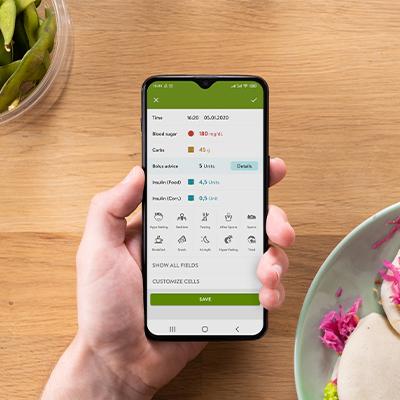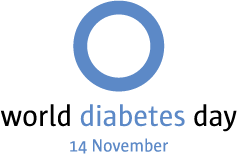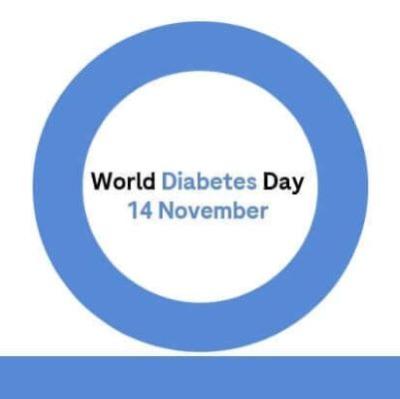Chef Bilal Saleh
Fattoush Cold Soup & Halloumi Ingredients: 1 fresh tomato 1 cucumber ½ a cup of mint leaves 1 glove of garlic ½ a cup of parsley leaves ½ green pepper 1 stem of spring onion 1 red radish 1 whole lemon 15 ml of olive oil Salt to taste 1...
Read MoreSay Cheers with Confidence
Living with diabetes means celebrating each little victory, every healthy choice and new habit that helps you stay on top of your blood sugar. That sort of focus can be infectious, which has us thinking about how diabetes can actually help families stay healthy together even during these celebrations. All across the globe, friends and family enjoy relaxing or celebrating together with a drink. If you have been diagnosed with diabetes, you may be worried about continuing to include the beer, wine, or spirits you enjoy at your gatherings and holidays—Are the carbs...
Read MoreSeasonal Changes in Diabetes Management
As someone with diabetes, you know the daily struggles that come along with properly managing your condition. The meal planning, exercise requirements and blood sugar monitoring often just become second nature to you as you learn how to adapt your lifestyle to keep your blood sugar in optimal range. Unfortunately, seasonal changes can throw a spanner into the works, upsetting your seemingly well-balanced life. Below you will find helpful information on how to handle seasonal changes and what you can do to make the adjustment period less stressful: ...
Read MoreTips for a Stress-Free Holiday
Ready to start enjoying the holidays? Here are 12 tips we created to help you have a stress free holiday! Tip 1: Don’t let them ruin dessert. Chances are, some well-meaning person will want to make a diabetic dessert just for you. That’s sweet (although the dessert certainly won’t be). Offer to bring dessert, and then show up with the real thing. It’s the holidays. Tip 2: Make a list and check it twice. Write down every gift, task, and...
Read MoreGet your confidence back with the mySugr Bolus Calculator
Meals can be the best part of your day – until you have to figure out your insulin doses. First the carb counting. Then tedious and complex calculations. Finally, the lingering fear of hypoglycemia – just because you had to estimate your insulin dose a little here and there. Calculating your insulin doses when you are on multiple daily insulin injection therapy can be tough. Luckily, the mySugr app now comes with a built-in bolus calculator to help you confidently determine your bolus insulin doses. Remember! Bolus insulin = a single dose of rapid/short-acting insulin that you give at mealtime to...
Read MoreInsulin Treatment
Insulin is a natural hormone made in your pancreas. It moves blood glucose from your blood into your cells. If your body cannot produce its own insulin, it may be necessary to take insulin in order to maintain healthy blood glucose levels. Insulin can be injected using a syringe or a pen, or through an insulin pump. Insulin cannot be taken in pill form because the acids in the stomach will break it down. There are a variety of insulin types, brands and sources. Healthcare professionals often prescribe 2 types of insulin: mealtime insulin and background insulin. Mealtime insulin (bolus) is used to control after-meal blood glucose...
Read MoreHow Parents with Diabetes Can Make Their Wellness a Family Priority
For many of us, diabetes is a family affair. Especially when a parent has diabetes, managing the disease with physical activity and healthy food choices can impact every member of the family. This World Diabetes Day, we’re thinking about this as an opportunity to explore the ways diabetes can actually help the entire family get healthy. What do you do when your kids want pizza but you know your blood sugar has been high today? Or when you need to burn some energy but you can’t get your kids to get off the couch and go to the park with you? As a parent managing diabetes, you have an opportunity to model...
Read MoreWorld Diabetes Day: What is diabetes?
“What is diabetes?” might have been the first question you had when you were diagnosed. It might be the first question a family member or friend asks. Essentially, diabetes is too much glucose (sugar) in the blood. Diabetes is a chronic condition that occurs when your pancreas is no longer able to make insulin, or when the body cannot make good use of the insulin it produces. Insulin is a hormone made by the pancreas, which acts like a key to let glucose from the food we eat pass from the blood stream into the cells...
Read MoreWorld Diabetes Day 2022: Access to Diabetes Care
Today, approximately 537 million people worldwide live with diabetes, according to the International Diabetes Federation (IDF) and the number is expected to rise to above 700 million by 2040.1 For the vast majority of them the fundamentals of daily diabetes management are still beyond reach, this is especially true for the ones living on low- and middle-income countries – which is 3 out of 4 adults living with diabetes. Moreover, almost 1 in 2 people with diabetes are unaware of their condition which results in over 200 million people being undiagnosed.1 The diabetes epidemic and its existing health disparities need to be...
Read MorePages
Say Cheers with Confidence
Living with diabetes means celebrating each little victory, every healthy choice and new habit that helps you stay on top of your blood sugar. That sort of focus can be infectious, which has us thinking about how diabetes can actually help families stay healthy together even during these celebrations. All across the globe, friends and family enjoy relaxing or celebrating together with a drink. If you have been diagnosed with diabetes, you may be worried about continuing to include the beer, wine, or spirits you enjoy at your gatherings and holidays—Are the carbs...
Read MoreSeasonal Changes in Diabetes Management
As someone with diabetes, you know the daily struggles that come along with properly managing your condition. The meal planning, exercise requirements and blood sugar monitoring often just become second nature to you as you learn how to adapt your lifestyle to keep your blood sugar in optimal range. Unfortunately, seasonal changes can throw a spanner into the works, upsetting your seemingly well-balanced life. Below you will find helpful information on how to handle seasonal changes and what you can do to make the adjustment period less stressful: ...
Read MoreTips for a Stress-Free Holiday
Ready to start enjoying the holidays? Here are 12 tips we created to help you have a stress free holiday! Tip 1: Don’t let them ruin dessert. Chances are, some well-meaning person will want to make a diabetic dessert just for you. That’s sweet (although the dessert certainly won’t be). Offer to bring dessert, and then show up with the real thing. It’s the holidays. Tip 2: Make a list and check it twice. Write down every gift, task, and...
Read MoreGet your confidence back with the mySugr Bolus Calculator
Meals can be the best part of your day – until you have to figure out your insulin doses. First the carb counting. Then tedious and complex calculations. Finally, the lingering fear of hypoglycemia – just because you had to estimate your insulin dose a little here and there. Calculating your insulin doses when you are on multiple daily insulin injection therapy can be tough. Luckily, the mySugr app now comes with a built-in bolus calculator to help you confidently determine your bolus insulin doses. Remember! Bolus insulin = a single dose of rapid/short-acting insulin that you give at mealtime to...
Read MoreInsulin Treatment
Insulin is a natural hormone made in your pancreas. It moves blood glucose from your blood into your cells. If your body cannot produce its own insulin, it may be necessary to take insulin in order to maintain healthy blood glucose levels. Insulin can be injected using a syringe or a pen, or through an insulin pump. Insulin cannot be taken in pill form because the acids in the stomach will break it down. There are a variety of insulin types, brands and sources. Healthcare professionals often prescribe 2 types of insulin: mealtime insulin and background insulin. Mealtime insulin (bolus) is used to control after-meal blood glucose...
Read MoreHow Parents with Diabetes Can Make Their Wellness a Family Priority
For many of us, diabetes is a family affair. Especially when a parent has diabetes, managing the disease with physical activity and healthy food choices can impact every member of the family. This World Diabetes Day, we’re thinking about this as an opportunity to explore the ways diabetes can actually help the entire family get healthy. What do you do when your kids want pizza but you know your blood sugar has been high today? Or when you need to burn some energy but you can’t get your kids to get off the couch and go to the park with you? As a parent managing diabetes, you have an opportunity to model...
Read MoreWorld Diabetes Day: What is diabetes?
“What is diabetes?” might have been the first question you had when you were diagnosed. It might be the first question a family member or friend asks. Essentially, diabetes is too much glucose (sugar) in the blood. Diabetes is a chronic condition that occurs when your pancreas is no longer able to make insulin, or when the body cannot make good use of the insulin it produces. Insulin is a hormone made by the pancreas, which acts like a key to let glucose from the food we eat pass from the blood stream into the cells...
Read MoreWorld Diabetes Day 2022: Access to Diabetes Care
Today, approximately 537 million people worldwide live with diabetes, according to the International Diabetes Federation (IDF) and the number is expected to rise to above 700 million by 2040.1 For the vast majority of them the fundamentals of daily diabetes management are still beyond reach, this is especially true for the ones living on low- and middle-income countries – which is 3 out of 4 adults living with diabetes. Moreover, almost 1 in 2 people with diabetes are unaware of their condition which results in over 200 million people being undiagnosed.1 The diabetes epidemic and its existing health disparities need to be...
Read More








